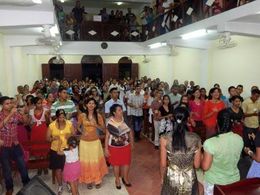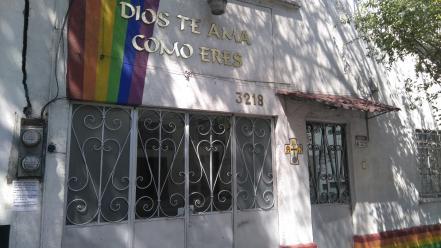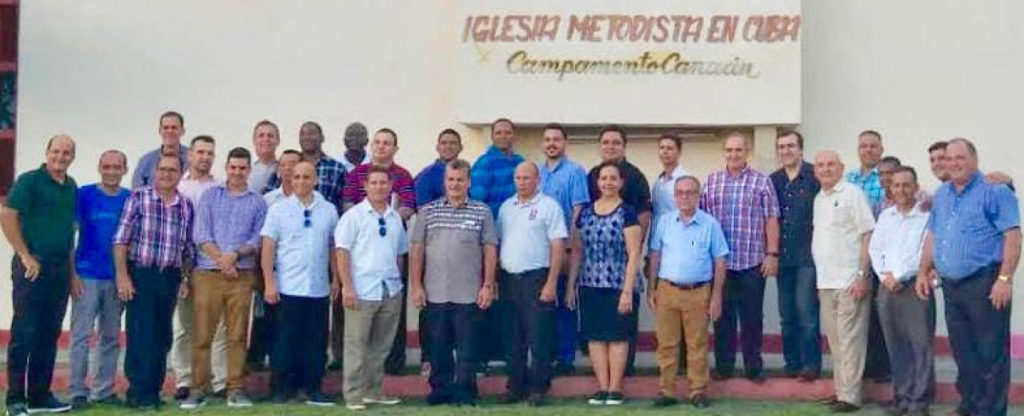 IGLESIAS EVANGELICAS FUNDAN NUEVA COALICION RELIGIOSA EN CUBA.
IGLESIAS EVANGELICAS FUNDAN NUEVA COALICION RELIGIOSA EN CUBA.
Siete iglesias fundaron este miércoles en Placetas, Villa Clara, la Alianza de Iglesias Evangélicas Cubanas (AIEC), porque “las denominaciones que la integran no se sienten representadas delante de las autoridades y el pueblo cubano por el Consejo de Iglesias de Cuba” (CIC), calificado con frecuencia de oficialista.
El acta fundacional, rubricada en el Campamento Metodista Canaán, reúne las firmas de 28 líderes de la Liga Evangélica de Cuba (LEC), las convenciones Bautista Occidental y Oriental, las iglesias Buenas Nuevas, Metodista, Asambleas de Dios y Evangélica Betel.
El CIC, nacido en 1941 como Concilio de Iglesias Evangélicas, ha sufrido varias transformaciones, entre ellas la introducción del ecumenismo en los años 70, que en 1989 posibilitó a instituciones no cristianas ser incluidas como asociados fraternales, por ejemplo, la Comunidad Hebrea y la Asociación de Autorrealización Yoga.
El control al que está sometido el CIC por parte del Estado cubano le ha hecho perder prestigio dentro de la comunidad creyente nacional, al igual que sus continuas intervenciones en la entrada y distribución de Biblias en el país.
A la AEIC pertenecen asociaciones religiosas no adscritas al CIC, que “se sienten motivadas a trabajar unidas en la defensa de los valores bíblicos”, argumentó la recién fundada alianza en una declaración.
En lo que va de año, la Liga Evangélica de Cuba y otras denominaciones han informado de la negación de visas religiosas a varios invitados internacionales a actividades eclesiales. Tales acciones del Gobierno suceden tras la “aprobación” de la nueva Constitución cubana, cuando cayeron a niveles inéditos en la historia revolucionaria los votos favorables a la propuesta estatal, en lo que fue decisiva la actuación de la comunidad cristiana nacional.
Los líderes evangélicos se negaron reiteradamente a ceder a las presiones del Partido Comunista para que apoyaran el texto constitucional y miles de feligreses rechazaron públicamente ese documento.
Los creyentes pidieron cambios en el texto constitucional, entre ellos un reconocimiento más explícito de la libertad de conciencia, mayor libertad de expresión y el mantenimiento del matrimonio como la unión de un hombre y una mujer. En ese empeño fueron el grupo que mayor enfrentamiento tuvo con el Estado.
“No puedo votar a favor de algo que va en contra de muchos de mis principios. Es triste, pero es una realidad”, aseguró a The Associated Press la pastora Álida León, presidenta de la Liga Evangélica de Cuba.
Los cristianos (tanto católicos como evangélicos) son uno de los sectores más fuertes y mejor organizados dentro de la sociedad civil cubana. Por ese motivo, en décadas pasadas a sus miembros se les prohibía acceder a carreras como Periodismo y Pedagogía. Hoy aún se les impide acceder a los medios de comunicación.
 EVANGELICAL CHURCHES FOUNDED NEW RELIGIOUS COALITION IN CUBA.
EVANGELICAL CHURCHES FOUNDED NEW RELIGIOUS COALITION IN CUBA.
Seven churches founded this Wednesday in Placetas, Villa Clara, the Alliance of Evangelical Cuban Churches (AIEC), because “the denominations that make it up do not feel represented in front of the authorities and the Cuban people by the Council of Churches of Cuba” (CIC ), often described as an official.
The foundation act, initialed in the Canaán Methodist Camp, gathers the signatures of 28 leaders of the Evangelical League of Cuba (LEC), the Western and Eastern Baptist conventions, the Good News, Methodist, Assemblies of God and Evangelical Bethel churches.
The CIC, born in 1941 as a Council of Evangelical Churches, has undergone several transformations, including the introduction of ecumenism in the 70s, which in 1989 made it possible for non-Christian institutions to be included as fraternal associates, for example, the Hebrew Community and the Yoga Self-Realization Association.
The control to which the CIC is subjected by the Cuban State has made it lose prestige within the national believing community, as well as its continuous interventions in the entry and distribution of Bibles in the country.
AEIC belong to religious associations not attached to the CIC, which “feel motivated to work together in the defense of biblical values,” argued the newly founded alliance in a statement.
So far this year, the Evangelical League of Cuba and other denominations have reported the denial of religious visas to several international guests for ecclesial activities. Such actions of the Government happen after the “approval” of the new Cuban Constitution, when the favorable votes to the state proposal fell to unprecedented levels in the revolutionary history, in what was decisive the action of the national Christian community.
Evangelical leaders repeatedly refused to yield to Communist Party pressures to support the constitutional text and thousands of parishioners publicly rejected that document.
The believers asked for changes in the constitutional text, among them a more explicit recognition of the freedom of conscience, greater freedom of expression and the maintenance of marriage as the union of a man and a woman. In that effort, they were the group that had the greatest confrontation with the State.

“I can not vote for something that goes against many of my principles, it’s sad, but it’s a reality,” Pastor Álida León, president of the Evangelical League of Cuba, told The Associated Press.
Christians (both Catholics and Evangelicals) are one of the strongest and best-organized sectors within Cuban civil society. For that reason, in past decades its members were forbidden access to careers such as Journalism and Pedagogy. Today they are still prevented from accessing the media.
Agencies/ CDC/ Yoe Suarez, La Habana/ Extractos/ Excerpts/ Internet Photos/ Arnoldo Varona/ www.TheCubanHistory.com
THE CUBAN HISTORY, HOLLYWOOD.



 < EVANGELICAL Churches Founded New Coalition in Cuba. Photos.
< EVANGELICAL Churches Founded New Coalition in Cuba. Photos.





